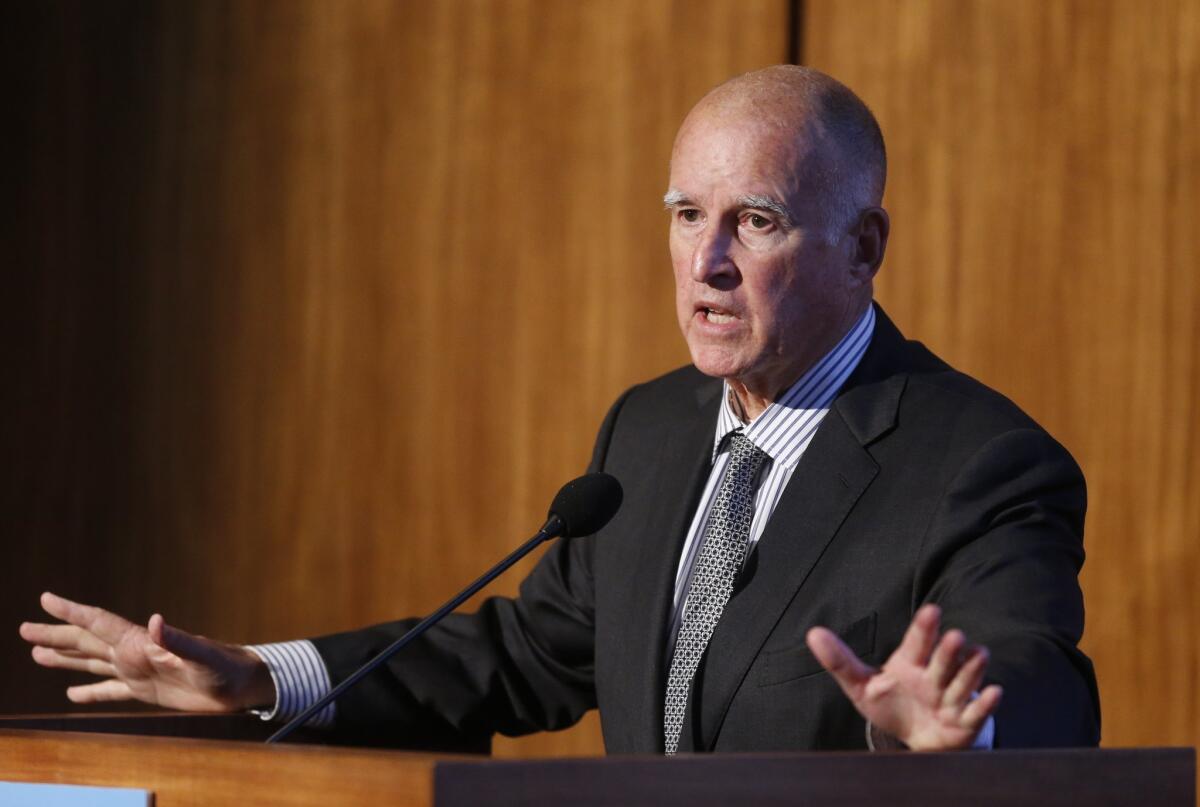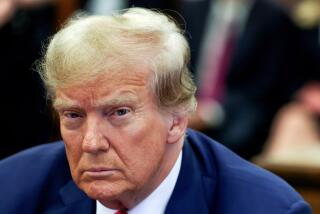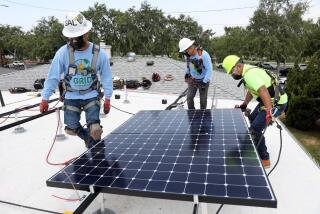Brown readies to take spot on global climate stage: ‘They’re not calling him Moonbeam anymore’

Gov. Jerry Brown speaks at the Carbon Neutrality Initiative at UC San Diego in October. Brown will be in Paris this week for the global climate change summit.
Gov. Jerry Brown was deep into a two-hour meeting on climate change with some of California’s top scientists when he interjected a highly technical and much more personal question.
He wanted to install solar panels to generate his own power on his family’s ranch in Colusa County, then find a way to feed the electricity directly into energy-efficient lighting.
“He said, ‘I want to be an example for California,’” said Veerabhadran Ramanathan, an atmospheric scientist who attended the meeting in the governor’s Oakland office.
Brown’s question was about more than attempting to emulate the self-reliance of his great-grandfather, who settled the ranch generations ago. He wanted to make sure he was using technology that’s key to addressing the very modern problem of a warming planet.
“The laws of nature are immutable,” Brown said in an interview. “You have to conform to them, not make them conform to you.”
Throughout his political career, Brown has displayed a desire to minimize society’s footprint on the Earth -- a stance that will gain a global platform when he arrives in Paris on Friday to participate in the U.N. summit on climate change.
In his spartan lifestyle as a young Jesuit seminarian, his famously barren apartment when he was governor the first time in the 1970s and his more recent campaign to slash greenhouse gas emissions, Brown has always explored ways to limit consumption.
Four decades ago, his focus on the environment -- talking of “Spaceship Earth” and exhortations that “small is beautiful” -- was a curiosity. But as 50,000 people gather in Paris in an ongoing effort to stop global warming, it’s clear that the world has caught up with Brown.
During his weeklong trip, the governor will tout California’s policies, rub shoulders with corporate executives, sign agreements with foreign leaders and be feted at the U.S. ambassador’s residence for his efforts to urge a stronger international accord at the summit.
“They’re not calling him Moonbeam anymore,” said Tom Hayden, an environmental activist and former state legislator who has worked with Brown for years. “This is his moment.”
Brown’s life has changed significantly since he was governor in the 1970s. He lives with his wife in a house in the Oakland hills, and they’re preparing to move into the historic and newly renovated governor’s mansion. They have accumulated millions of dollars in investments in stocks and real estate.
But the governor’s interest in a simpler existence remains evident about 60 miles north of Sacramento in a rural area outside the town of Williams.
Brown’s great-grandfather, a Prussian immigrant named August Schuckman, settled there, in the Sierra foothills, more than a century ago. The governor and his family still own hundreds of acres in an area where cattle graze amid the oak trees.
The ranch can be reached on a gravel road, and visitors sleep on cots in two small cabins.
It’s where Brown, the 77-year-old elected leader of the world’s eighth largest economy, will occasionally spend the night without electricity or running water. The land, he has said, is “endlessly fascinating.”
The governor plans to build a house there, and Colusa County Supervisor John Loudon said Brown is carefully considering its potential environmental impact.
Water wells, for example, could be powered by the same solar panels used for LED lighting. Flush toilets would be eschewed in favor of composting.
“He wants to have a completely self-contained environment up there,” said Loudon, whom Brown appointed supervisor. “He wants to be off the grid.”
Oil, gas, coal has created the wealth we enjoy. What was the source of our wealth now becomes the challenge of our future.
— Gov. Jerry Brown, speaking at an event in Toronto earlier this year
“It’s a school for learning about life,” he said.
The governor raised eyebrows recently when it was revealed that he asked state employees for help researching his ranch, including whether there was any potential for oil and gas. He said he was interested in the history of the land, not drilling himself.
Brown draws a link between his great-grandfather’s life in California to modern environmental challenges. After winning his fourth and final term last year, the governor pointed to a picture of Schuckman and called him an inspiration because of his “courage to forge into the unknown.”
“Today, it’s not the open space, but we do have uncharted territory,” Brown said, offering climate change as an example.
Although the term climate change hadn’t entered the lexicon when Brown became governor the first time in 1975, he was already talking about problems and technologies that are center stage today.
To alleviate smog in Los Angeles, he pushed for tougher vehicle regulations and catalytic converters to clean up tailpipe emissions. He enacted tax credits for Californians to install solar panels on their homes, and he talked of how the state could “export solar technology for peaceful uses.”
See the most-read stories this hour >>
In his first State of the State speech in 1976, Brown said there was no more time for “glib statements” about protecting the environment, that an “era of limits” meant California would need to ration its natural and financial resources.
Four years later, as he prepared his second presidential campaign, Brown said, “the American nation is over-committed to consumption.” Unless changes are made, “the generation that follows us will have to make an even more painful transition.”
Brown has applied the same lens to California’s ongoing drought, ordering the state’s first mandatory restrictions on urban water use and warning residents that “the idea of your nice little green grass” being watered every day would be “a thing of the past.”
Hayden, whom Brown appointed to lead a state solar council in the 1970s, said the famously tight-fisted governor also makes little distinction between economic and environmental waste.
“Frugality and a passion for protecting the environment went hand in hand with him,” Hayden said. “Government waste could be politically argued as a waste of tax dollars. Waste could also be argued as a waste of precious resources.”
Brown summed up this philosophy at a San Francisco forum last month.
“Waste is never good,” he said. “That’s a big part of our challenge: getting more out of stuff than we currently do.”

Gov. Jerry Brown says for him, climate change is a topic that’s more personal than political.
How the world manages its resources is the central question being considered at the U.N. summit. The goal is an international accord to limit global warming and transition to a future in which solar panels and electric vehicles are substituted for coal and gasoline.
In Brown’s view, that requires nothing less than a reckoning with notions of prosperity.
“Oil, gas, coal has created the wealth we enjoy,” he said at a Toronto conference in July. “What was the source of our wealth now becomes the challenge of our future.”
Since returning to the governor’s office in 2011, Brown has built upon laws signed by his predecessors -- vehicle emissions rules enacted by Gov. Gray Davis, the cap-and-trade program launched by Gov. Arnold Schwarzenegger.
He’s also set new targets for increasing renewable energy in California, boosting energy efficiency and slashing oil consumption over the next 15 years -- long after his final term officially ends in 2019.
The energy goals were turned into law, but the last proposal, reducing petroleum use, was dropped amid heavy opposition from oil companies.
For environmentalists, Brown’s relationship with oil has been among the most confounding parts of his green record. Even though he’s sharply criticized the industry at times, saying it sells a “highly destructive” product, he’s benefited from campaign donations and supported oil production in the state.
“One of the things that’s holding us back is the oil and gas industry and the governor’s unwillingness to take them on directly,” said Adam Scow, the California director for the anti-fracking advocacy group Food & Water Watch.
Brown has refused to ban fracking, most recently at the San Francisco forum.
“We’re going to take out the oil in the most efficient way possible,” he said.
In another apparent irony, Brown also said he relies on a gas-guzzling Crown Victoria to get around. Asked when he might get an electric car, his distaste for waste seemed to clash with his green sensibilities.
“Part of me wants to drive it until it drops,” he said.
Twitter: @chrismegerian
ALSO:
Trump on climate talks: ‘What a ridiculous situation’
California’s snowpack is deeper than last year, but more is needed, officials say
Leader of Legislature’s moderate Democrats will resign to seek government relations job
More to Read
Get the L.A. Times Politics newsletter
Deeply reported insights into legislation, politics and policy from Sacramento, Washington and beyond. In your inbox three times per week.
You may occasionally receive promotional content from the Los Angeles Times.







